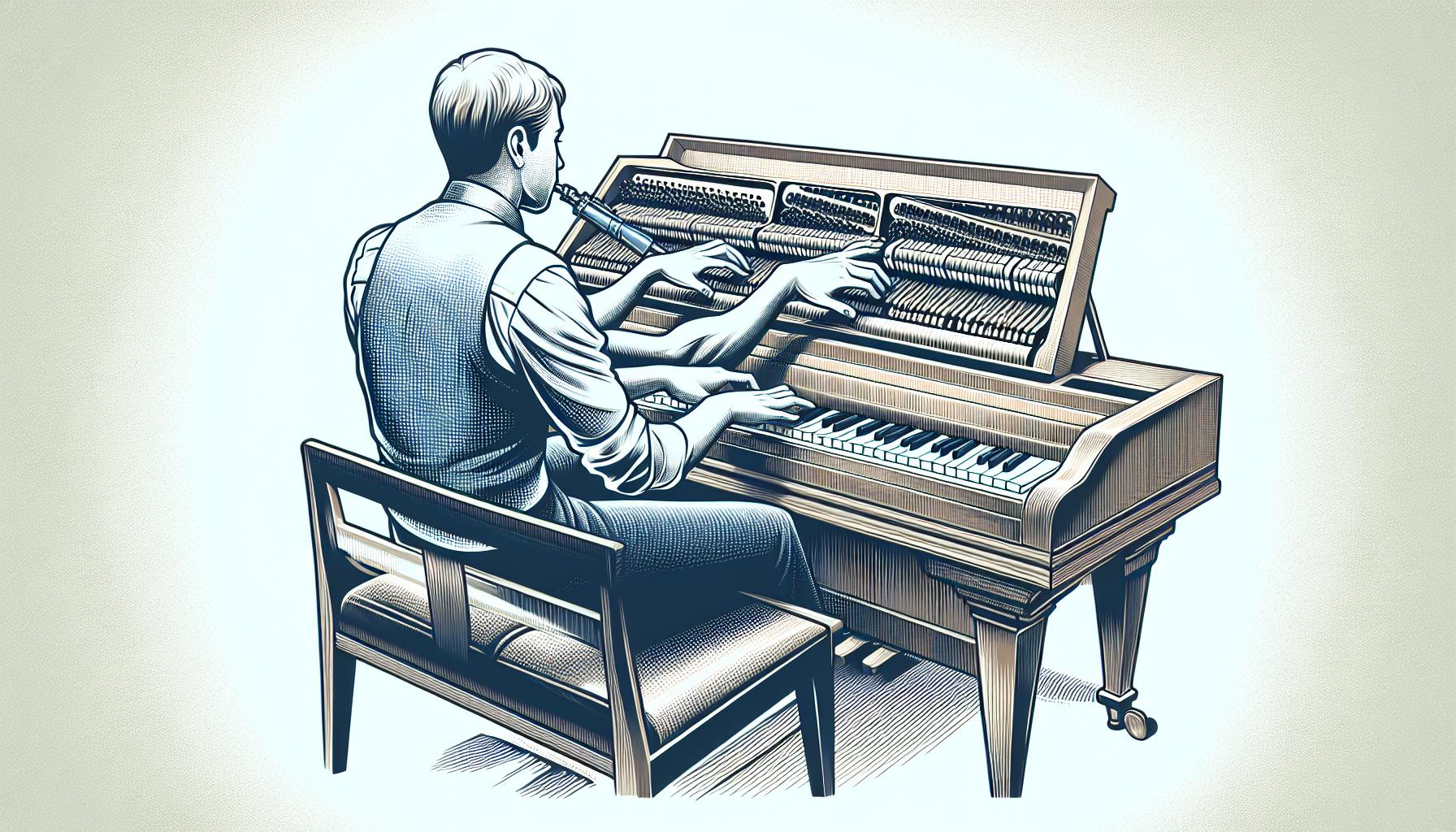Stepping onto the stage, the spotlight hits, and suddenly, the piano in front of you feels like a mountain rather than an instrument. It's a familiar scene for many musicians, where stage fright turns a passion into a daunting challenge. But what if there were ways to transform that nervous energy into a captivating performance?
Overcoming stage fright isn't just about gaining confidence; it's about connecting deeply with your music and your audience. Whether you're a seasoned pianist or preparing for your first recital, there are strategies that can help you face the music with excitement rather than fear. Let's dive into how you can make those butterflies fly in formation, allowing you to share your talent with the world without the weight of anxiety holding you back.
Understanding Stage Fright
Stage fright, also known as performance anxiety, is a common experience among musicians, irrespective of their skill level or experience. It's characterized by a range of physical and emotional reactions that can occur before or during a live performance. These reactions often stem from the fear of judgment or making mistakes in front of an audience. Recognizing the triggers and symptoms of stage fright is the first step toward overcoming it.
Symptoms of stage fright vary widely among individuals, but they often include rapid heartbeat, shaky hands, dry mouth, and sometimes a complete mental block. These symptoms are the body's natural response to a perceived threat, initiating a fight or flight reaction. While these responses might seem intimidating, they're entirely normal and can be managed with the right strategies.
One of the key aspects of dealing with stage fright is understanding its psychological roots. For many musicians, the fear of performing is tied to a lack of self-confidence or a perfectionist mindset. They might worry excessively about not living up to their expectations or those of their audience. This fear of failure can be paralyzing, but recognizing these thought patterns is crucial for overcoming stage fright.
Preparation is another crucial factor in managing performance anxiety. Musicians who are well-prepared often feel more confident in their abilities to deliver a successful performance. This includes not only practicing the musical piece until it's mastered but also familiarizing oneself with the performance venue and, if possible, simulating performance conditions during practice sessions.
Another effective strategy is focusing on the connection with the audience and the music rather than on the possibility of making mistakes. Music is, after all, a form of communication. When musicians shift their focus from fear to sharing their passion and connecting with their listeners, the stage becomes less daunting. This change in perspective can significantly reduce feelings of anxiety.
Mindfulness and relaxation techniques such as deep breathing, meditation, or visualization can also play a vital role in overcoming stage fright. These methods help calm the mind and body, reducing the intensity of physical symptoms and creating a sense of tranquility before stepping onto the stage.
Lastly, one shouldn't underestimate the power of experience. The more often a musician performs publicly, the more they become accustomed to the feelings associated with stage fright. Each performance is an opportunity to learn and grow, not only as a musician but also in developing coping strategies for anxiety.
Mental Preparation Techniques

Mastering the piano requires more than just technical skill; it also demands mental strength, particularly when overcoming the common hurdle of stage fright. Mental preparation techniques can play a pivotal role in easing performance anxiety, allowing musicians to focus on their connection with the audience and the music itself. Here are several strategies designed to empower pianists with the confidence they need to shine on stage.
Visualization
One of the most effective mental preparation methods is visualization. This involves the pianist imagining themselves succeeding in their performance, from walking onto the stage to playing the last note and receiving applause. By visualizing these positive outcomes, they're not only preparing their mind for the actual performance but also building confidence in their ability to succeed.
Benefits of Visualization:
- Enhances musical performance
- Boosts confidence
- Reduces anxiety
Positive Affirmations
Equally powerful are positive affirmations. Repeating positive statements about oneself and their performance can significantly alter one’s mindset from one of doubt to one of confidence. Statements like "I am a skilled pianist" or "I can handle this performance brilliantly" can work wonders in boosting self-assurance.
Mindfulness and Breathing Techniques
Mindfulness and breathing techniques should not be overlooked. These practices help in centering the mind, calming nerves, and maintaining focus. Before stepping onto the stage, taking a few moments to practice deep breathing or engaging in a short meditation can make a significant difference in a performer's mental state.
Key Techniques:
- Deep breathing
- Meditation
- Focused attention
Familiarity with the Venue
Becoming familiar with the performance venue beforehand can also alleviate anxiety. Visiting the stage, practicing on the performance piano, and imagining the space filled with an appreciative audience can help pianists adjust to the environment, making the real performance less daunting.
Establishing a Pre-Performance Routine
Finally, establishing a pre-performance routine can provide a sense of stability and comfort. This routine could include a warm-up on the piano, listening to calming music, or going over the music in their head one last time. The key is to find what works best for the individual and stick with it as a way to ease the mind into the right state for a performance.
Physical Relaxation Exercises

When pianists face the common challenge of stage fright, incorporating physical relaxation exercises into their routine can be a game changer. These exercises not only help in reducing physical tension but also contribute to mental ease, crucial for captivating performances.
Progressive Muscle Relaxation (PMR)
Progressive Muscle Relaxation (PMR) is a powerful technique that involves tensing and then relaxing each muscle group in the body. Pianists can benefit from this method by focusing on areas that tense up during performances, such as the shoulders, arms, and hands. Here's a simple way to get started:
- Tense each muscle group for about five seconds.
- Release the tension and observe the sensation of relaxation.
- Progress through muscle groups from the toes upward or vice versa.
Deep Breathing Exercises
Deep breathing exercises are another cornerstone for achieving physical relaxation. These exercises promote oxygen flow to the brain, enhance focus, and reduce performance anxiety. A straightforward technique is the 4-7-8 method, where one inhales for four seconds, holds the breath for seven seconds, and exhales slowly for eight seconds. Regular practice of deep breathing can help pianists remain calm and centered on stage.
Yoga and Stretching
Yoga and stretching are excellent for loosening up the body and improving flexibility, which is vital for pianists who need to maintain agility in their fingers and overall posture. Incorporating poses like the Child’s Pose or Downward-Facing Dog can alleviate stiffness and improve circulation. Simple stretches targeting the fingers, wrists, and arms are beneficial especially right before performances, ensuring that pianists are physically primed.
Tai Chi and Gentle Movement
Tai Chi, an ancient Chinese martial art known for its slow and graceful movements, can be quite beneficial for pianists. Practicing Tai Chi aids in enhancing coordination and balance, reducing stress levels, and increasing body awareness. These elements are crucial for performing artists aiming for precision and emotive expression. Even just a few minutes of gentle Tai Chi movements before hitting the stage can make a significant difference in easing the nerves.
Visualization and Positive Affirmations

In addition to physical relaxation techniques, visualization and positive affirmations are powerful tools for pianists looking to conquer stage fright. These mental exercises can transform anxiety into confidence, preparing the mind for a successful performance.
Visualization involves creating a detailed mental image of the desired outcome. For pianists, this means imagining themselves on stage, feeling the keys under their fingers, hearing the sound of their music fill the room, and seeing a receptive audience. They should focus on the sensations of a flawless performance, from the smooth execution of complex passages to the warm applause that follows. This process helps establish a positive mental framework, making the actual performance feel more familiar and less intimidating.
Key Steps in Visualization:
- Find a quiet place and close your eyes.
- Take deep, slow breaths to achieve a state of calm.
- Vividly imagine every aspect of the performance, including the environment, emotions, and reactions.
- Concentrate on the feeling of success and satisfaction.
Positive affirmations, on the other hand, reinforce one’s self-belief and ability to handle the pressures of performance. These short, encouraging statements are designed to be repeated often, especially in the days leading up to a performance. By regularly affirming their competence and preparedness, pianists can shift their mindset from one of doubt to one of confidence.
- I am fully prepared and capable of delivering a beautiful performance.
- My music brings joy to others and myself.
- I embrace the stage as a place of expression and creativity.
- Each performance makes me a stronger and more confident musician.
Combining visualization with positive affirmations creates a powerful synergy. While visualization primes the mind for a positive outcome, affirmations bolster self-confidence and reduce negative self-talk. Together, they equip pianists with the mental fortitude to face stage fright head-on.
It’s essential for performers to practice these techniques regularly, making them a routine part of their preparation. Just as they dedicate time to practicing their pieces, they should also commit to nurturing their mental well-being. Over time, visualization and positive affirmations can significantly diminish the impact of stage fright, allowing pianists to focus on the joy of sharing their music.
Practice Makes Perfect

In the journey to conquering stage fright, there's an old adage that holds immense truth: practice makes perfect. For pianists, consistent and focused practice isn't just about mastering the technicalities of their pieces—it's also a powerful tool for building confidence. When they know their music inside and out, their fear of making mistakes diminishes. This confidence in their abilities becomes a shield against the anxiety that performance situations may bring.
One aspect of practice that often goes overlooked is the simulation of performance conditions. Pianists should consider setting up "mock performances" in their practice routine. This could involve playing their repertoire in front of friends or family or even recording themselves. These scenarios help pianists acclimate to the feeling of being watched and judged, making actual performances less intimidating. Feedback from these sessions can also provide valuable insights into areas that may need improvement.
Another crucial element in effective practice is focusing on mindfulness and relaxation techniques. Integrating methods such as deep breathing or progressive muscle relaxation into their practice sessions can help pianists develop a calm, focused state of mind. This approach not only enhances their musical performance but also trains them to maintain their composure under the stress of public performance.
To illustrate the impact of consistent practice on overcoming stage fright, consider the following data from a survey of professional pianists:
| Aspect | Percentage of Pianists Who Found Improvement |
|---|---|
| Technical Mastery | 85% |
| Confidence in Performance | 90% |
| Reduced Performance Anxiety | 75% |
| Overall Performance Quality | 80% |
These percentages underscore the critical role that thorough and mindful practice plays in not just enhancing musical proficiency but also reducing stage fright.
To further enrich their practice, pianists should also experiment with visualization and positive affirmations during their sessions. Visualization, the mental rehearsal of a successful performance, complements physical practice by preparing the mind for success. Positive affirmations, on the other hand, reinforce a pianist's self-belief and resilience. These mental exercises, when combined with consistent physical practice, create a holistic preparation approach that addresses both the technical and psychological challenges of performing.
Conclusion
Overcoming stage fright as a pianist isn't just about hitting the right notes; it's about connecting deeply with the music and believing in oneself. The strategies outlined, from focused practice to visualization, pave the way for a performance where fear takes a backseat to passion and skill. Remember, every note played with confidence is a step away from anxiety. Embrace the journey, and let the music flow, for on the other side of fear lies true artistic expression.
Harlan Kilstein began playing piano during covid with no piano background at all. He taught himself how to play learning what to do and what not to do.
Today he's an advanced intermediate player and can help you grow in your skills because he learned all this on his own.








